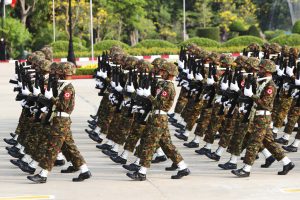Singaporean companies are among the arms brokers in keeping Myanmar’s military supplied with arms and are “complicit” in the atrocity crimes that it has committed since last year’s coup d’etat, according to the advocacy group Justice For Myanmar (JFM).
In a report published yesterday, the Myanmar-based organization identified a total of 116 companies that have supplied millions of dollars of arms and equipment to the Myanmar military. Of these, 31 companies have had active business with the military since the February 2021 coup, while another 27 firms have done so since 2017, the year that the armed forces launched violent – and allegedly genocidal – assaults against the Rohingya communities of western Myanmar.
According to JFM, the report is based on leaked documents from the Ministry of Defense’s procurement department, in addition to industry sources, and other information available online.
Linked to the total of 78 Myanmar-based companies supplying the military are at least 38 subsidiary or associated companies in Singapore – a country that has long been known as an offshore trade hub and financial sanctuary for the Myanmar military and its galaxy of allied cronies and businesspeople. One was a firm called Venture Sky International Ltd, which “had at least 12 contracts with the Myanmar Air Force to provide aircraft spare parts in 2016 alone.” Another was a Singaporean subsidiary of the Myanmar company MCM Pacific Pte Ltd, which has “provided parts for Mi-2, Mi-17, and Bell 206 helicopters to the Myanmar Air Force. ”
The involvement of Singapore firms in supplying the Myanmar army “poses an imminent threat to the lives of millions of Myanmar people,” the report stated. “As a member of ASEAN, Singapore has an important role to play to resolve the Myanmar crisis. It must start by ending its complicity in the junta’s international crimes.”
More broadly, the report offers granular detail about where and how the Myanmar military supplies itself with arms, military vehicles, and the spare parts necessary to keep its jets, tanks, and armored personnel carriers in the field. In the report, which includes a link to an Excel spreadsheet listing the companies and their directors and key shareholders, JFM called for “urgent sanctions against these companies and individuals.” It also specifically called on the government of Singapore to “ban the use of its territory, including its banks and ports, for the supply of arms and equipment to the Myanmar military.”
Western nations like the United States, United Kingdom, and Canada have already imposed sanctions against a number of the most notorious and high-profile arms dealers. Chief among these are the Htoo Group of Companies, a firm owned by the prominent tycoon Tay Za, which is responsible for importing jet fighter parts from Ukrainian and Russian firms; the Myanmar Chemical and Machinery Co., which JFM links to the purchases of a raft of equipment, including K-8 trainer jets, armored personnel carriers, and light tanks; the International Gateways Group, which “is one of the biggest arms suppliers to the Myanmar Air Force and Navy, especially in trade from China.”
But as JFM notes, “only a few of the companies supplying arms and other products to the military junta have been sanctioned, while the vast majority are continuing to operate freely.”
It is debatable whether economic sanctions are the key to bringing down Myanmar’s military administration. The military has a long track record of weathering international isolation, and is lodged in a neighborhood of accommodating Asian neighbors, including China, India, and Thailand, to say nothing of Singapore, which has long resisted calls from activists to seize the dirty money from Myanmar parked in its banking system. But this report shows that if Western countries are truly interested in choking off the military’s funding, there are a lot more targets waiting to be brought into range.

































